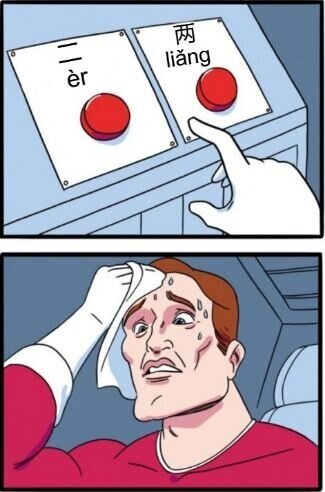二 vs 两 || The only explanation you'll ever need
Note: If you are new to characters or generally want some support while working through the example sentences in the next sections, we HIGHLY recommend downloading this plugin! It will help a ton with character reading, both in this article, and on the greater web in general. If you’ve already installed it, carry on! :)
A lot of people ask questions like:
"What's the difference between "二" and "两"?"
"How do I know when to use which?"
"Why are there are two ways to say "two?""
We're going to clear up all doubts right here and now!
(And then we'll test your knowledge with a quick quiz!)
Ahhh…the anxiety is too much!
Two ways to say "two"? I'm out!
No, don't leave! You can do this!
I promise it's actually really consistent, and it follows a lot of the same logic as English.
Wait...English has multiple ways of saying “2”?
Yep.
We have a couple ways to say “2” in English.
And...there it is.
OK, no more jokes. Let’s get into it. (I should never promise no more jokes...We know I can't keep that promise.)
When to use “两”
We use "两" when:
- we would think to make the object plural in English
That's it!
Another helpful hint:
"两" is ALWAYS followed immmediately by a measure word
("二" CAN be followed by a measure word too, like we will show a bit later, but not always like with "两”)
If you aren’t sure what a measure word is, it’s those things like “个” and “本” that connect numbers and objects.
Here are some examples of when to use “两”:
我有两个朋友.
I have two (individual) friends.
我看了两本书.
I read two (individual) books.
You may find it helpful to think of “两” as “a couple of...”
We use “两” whenever we would think to make the object plural in English.
When to use “二”
We use “二” when:
- we would say “the second” anything in English
- we are literally saying the number 2 (like in phone numbers or addresses).
我住在二楼.
I live at/on (the) 2nd floor.
今天是五月二号.
Today is May 2nd. (day of the month)
第二个车是我的.
(the) Second (individual) car is mine.
In the last example, we added a useful character: "第".
We use this character before general ordinal numbers like "first", "second", "third", etc. (第一,第二,第三)
When we use "第", we will ALWAYS use "二", not "两".
Quick Comprehension Check:
How do you say the month “February”?
How about “two months”?
(Hint: both use the word “月” (moon/month))
TRY NOT TO PEEK
Answer reveal:
February = 二月(because it’s the 2nd month)
Two months = 两个月
(because "months" is plural)
Did that all make sense?
How'd you do?
Are there any weird exceptions?
I wouldn’t call them exceptions, but there are a couple (两个) usages that tend to trip up students even after learning these concepts.
One is with numbers, and one is with time.
Numbers:
In general, we use “二” to say numbers, and we use “两” for plurals.
But what about when we have plurals and numbers?
(don’t worry, I promise it’s not that confusing!)
Thankfully, the logic in Chinese here is pretty similar to English.
Here are some examples of “二” and “两” appearing in numbers.
12 = 十二 (ten + two)
20 = 二十 (two x ten)
200 = 两百 (two x hundred)
2,000 = 两千 (two x thousand)
20,000 = 两万 (two x ten thousand)
200,000 = 二十万 (twenty x ten thousand)
2,000,000 = 两百万 (two hundred x ten thousand)
Did you notice any patterns?
Just like in English, for 12 and 20, we don’t use the concept of “two + somethings”.
But for hundreds, thousands, etc, we do.
Time:
This one is a bit trickier, but it becomes easier if we can change the way we think of hours on a clock.
Allow me to explain. :)
When saying "2:00", we say “两点”
现在两点半.
(Right) now (is) 2:30.
You can think of it as representing the time when there are two notches on the clock. (that's literally what it means in Chinese)
For "12:00", we say "十二点".
(Again, for 12 and 20 will never feature “两”. )
我十二点要吃饭.
I (at) 12:00 will eat food.
Other than that, you should be all good to go!
Recap:
- Whenever we are dealing with plurals, we use “两”
- For things like "second" and the numbers "2", "12", and "20", we use “二”.
Whooo! We did it! Let's go!!
Final Comprehension Check
Are you up for one final challenge? Think you can get them all right?
I know you can! :) Just believe!


